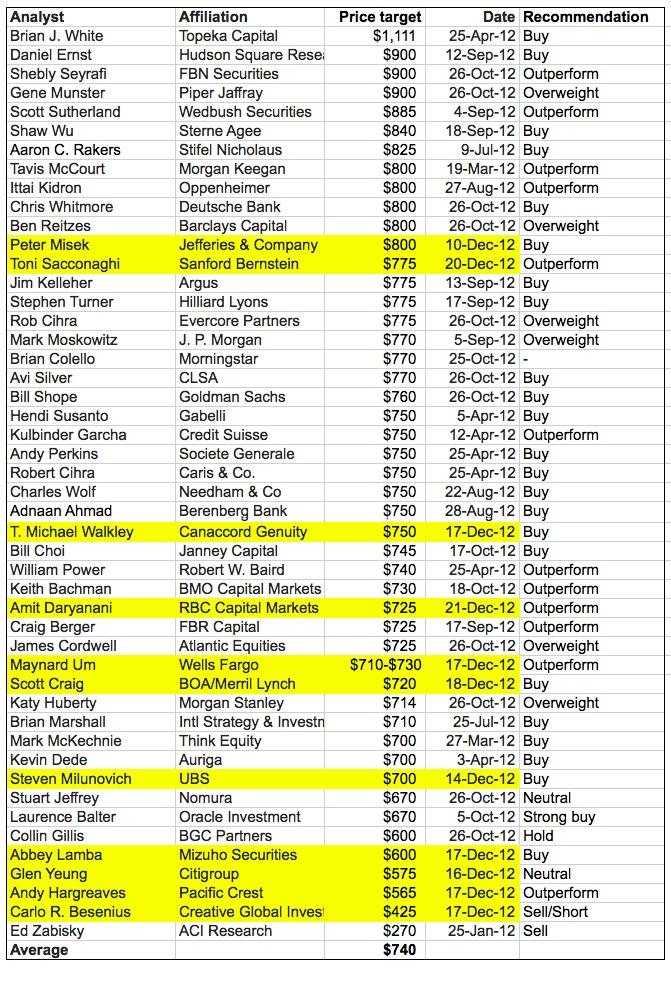Average analyst target for Apple drops to $740 among capital gains, fiscal cliff worries
With Apple's stock price falling ahead of an increase in capital gains tax and investors worried about the so-called "fiscal cliff," the average analyst price target for AAPL stock has fallen to $740.
A total of 11 analysts surveyed by Philip Elmer-DeWitt of Fortune 2.0 have reduced their price target in recent weeks. Even with those drops, the average $740 target for AAPL is $225, or 44 percent, above the company's actual price as of market close on Thursday.
One noteworthy holdout who has refused to reduce his price target for Apple is Brian White of Topeka Capital Markets. His latest note, which AppleInsider covered last week, reiterated his target price of $1,111.
But others, such as Peter Misek of Jefferies, have decided to lower their targets in light of recent losses. Misek said in a note to investors earlier this month that he believes average selling prices for smartphones have peaked, while the future for Apple's iPhone — and the rest of the industry — is in developing markets. His price target for AAPL was cut to $800.
Average analyst price targets compiled by Apple 2.0. Recent reductions highlighted.
Michael Walkley of Canaccord Genuity also trimmed his price target from $800 to $750 this month. But he, like most others, has maintained a "buy" rating for Apple, forecasting it to be a wise choice for investors.
Among the most bullish high-profile analysts are Gene Munster of Piper Jaffray ($900 price target), Shaw Wu of Sterne Agee ($840) and Ben Reitzes of Barclays Capital ($800). Those below the average price target are Amit Daryanani of RBC Capital Markets ($725), Maynard Um of Wells Fargo ($710-$730), and Brian Marshall of ISI Group ($710), and Katy Huberty of Morgan Stanley ($714). Citi Research initiated coverage of AAPL in November with a price target of $675.
Recent drops in Apple's stock price have left many investors and analyst grasping at potential answers. Blame has been placed on a higher capital gains tax that will kick in with the start of the new year, as well as worries about the U.S. government's "fiscal cliff" negotiations.
As for Apple specifically, some have suggested there are general concerns about iPhone sales and build orders, while some investors have expressed concerns over the company's gross margins, which are expected to shrink in the face of a massive product lineup refresh.
 AppleInsider Staff
AppleInsider Staff














 Amber Neely
Amber Neely
 Thomas Sibilly
Thomas Sibilly

 William Gallagher
William Gallagher
 Malcolm Owen
Malcolm Owen
 Christine McKee
Christine McKee










27 Comments
A debt free company with over $100 billion in cash, a ridiculously low P/E ratio, selling every piece of product it can produce, fabulous customer satisfaction... and yet treated by investors as if it's on the verge of bankruptcy and liquidation. Maybe Michael Dell was right after all.
Who cares what the [I]average[/I] analyst thinks? Why not go back and see how accurate each of those analysts has been with their projections for Apple over the past 10 years and then consider only those who have been making reasonably accurate predictions?
The best are the last two on the list. There's no way anyone setting an AAPL price target of $275 or even $450 has anything less than an anti-Apple agenda.
When a company like Amazon can post a quarterly loss and the next day their stock goes up 6% you know the market is rigged and a complete joke. The other day on CNBC an "analyst" predicted that Apple would drop another 30%. Her evidence? She checked out 10 different places and they all told her not to buy an iPhone 5 because it was just image and hype. Of course this "analyst" was pushing Nokia and Lumia phones. ;)
A debt free company with over $100 billion in cash, a ridiculously low P/E ratio, selling every piece of product it can produce, fabulous customer satisfaction... and yet treated by investors as if it's on the verge of bankruptcy and liquidation. Maybe Michael Dell was right after all.
That's all true but I feel what we're seeing now is a correction. The stock was overpriced mainly due to investors trying to inflate it, no fault of Apple. Now it's adjusted down closer to where it probably should have been.
Of course the adjustment has now undervalued the stock but that's the market. Stocks are always either over or undervalued and are never "just right."
Anyway I say all that because I believe that the downward spiral for the stock is almost over. Especially considering in the article investors couldn't even agree on why the stock has been falling. Fiscal Cliff? Capital Gains Tax? Those things would affect the whole market not just Apple.